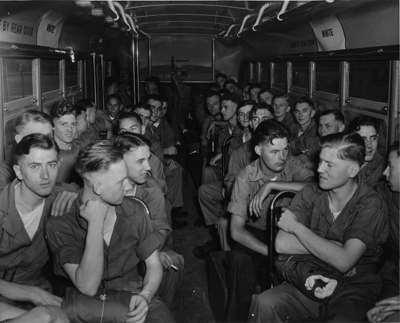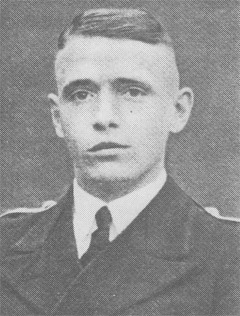The Journey to Prison Camps
Reinhold Pabel, a chronicler of these pre-camp experiences, best describes the experiences shared by the overwhelming majority of POWs. The date is January 2, 1944, and the Empress of Scotland had just finished unloading its cargo of prisoners.
And so we went ashore at Norfolk, Va., in the morning hours. After going through the customary delousing process we marched to the railroad station. There were immediate shouts of "Man, oh, man!" and "How about that?" when we followed orders to board the coaches of a waiting train. Most of us had always been transported in boxcars during the military service. These modern upholstered coaches were a pleasant surprise to everyone. And when the colored porter came through with coffee and sandwiches and politely offered them to us as though we were human beings, most of us forgot ... those anti-American feelings that we had accumulated ...
The guards at each end of the coaches had strict orders not to take chances with us. Whenever someone had to go to the washroom he was expected to raise his hand like a schoolboy in class so the guard could ... accompany him safely to the head of the car. . . . It all looked very amusing to me and I kept thinking what a beautiful confusion one could create by conspiring with a number of the boys in the coach to raise their hands simultaneously. What would the guards have done?
No matter how divided we prisoners might have been in our opinion of America, we were nearly all quite curious to find out ... what the United States would really be like ...
En route through Virginia and Kentucky we pressed our noses against the windowpanes to take in the sights. The first impression we had was the abundance of automobiles everywhere.
The transportation of prisoners to their new homes, despite the bureaucratic difficulties behind the scenes, was a successful and most often startling and educational experience for those unfamiliar with the breadth and beauty of the country.
A number of prisoners, however, were not pleased. In the many weeks since their capture, the prisoners, reinforced by the return to strict military discipline at the hands of their own officers, began to reorient themselves to their new situation. Earlier anxieties about the intentions of their captors, about their destinations and personal safety, were rapidly fading only to be replaced by the prisoners' determination to make the best of a bad situation and to exploit the weaknesses of their captors wherever possible. Complaints to the Swiss authorities increased. They referred to everything from discomfort at being forced to sleep in a sitting position during the trip to the intrusion of the porters bringing coffee. Others grumbled that their train routes were contrived to confuse them or avoid the devastated areas which the Luftwaffe must surely have created. One complaint of this type, registered by a Hans Galhard, as soon as he arrived at his new home at Camp Trinidad, Colorado, described the "brutalizing" train ride in the following manner: "The journey lasted about one hundred hours. In that time we were hardly allowed to move. The consequences were indigestion and blood pressure of the severest type. And then the watch! In each coach were two men with automatic pistols and two men armed with clubs. They transported us like the lowest criminals about which they seem to have plenty of experience in this country."
One former prisoner, Henry Kemper, went so far as to charge the American authorities with committing atrocities against the transported POWs. "We were put into box cars on the train trip from New York to Arkansas 60 to 100 men per car. It was a long and terrible ride. All we had to eat was orange jam, which they deliberately gave us to make us sick. The Americans knew what effects the orange jam had on our empty stomachs. They had previous experience at this. Everybody had diarrhea. A few of the older men died-how many I don't know-I just saw them throw the dead bodies off the train." Such charges are extremely rare, however, and unsubstantiated. While it is certainly possible that during the many hundreds of wartime POW train rides across the United States some prisoners experienced discomfort; that such discomfort was intentional governmental policy is unfounded.
To prevent this minority of prisoners from exploiting their available rights, guards and military police were warned against the "insidious danger of soft, sticky, sentiment, or marshmallow friendliness." Those Americans who dealt with the POWs were cautioned to remember that "the good-looking youth ... with such charm, was the same murderous maniac who fashioned the booby trap that blew American soldiers into bloody bits; the same Hitler youth who had kicked in a peasant's face in the name of the Fuehrer." The model guard, they were reminded, believed that "You don't have to be cruel to these guys, but you have to show them they're not going to get away with anything. If you start feeling sorry for them and soften up, they take advantage of you right away. We don't have to be mean, but we're going to have to be plenty hard-boiled!" With the exception of the troublesome minority of complaining prisoners, however, and an accidental train wreck in Virginia on September 16, 1943, the shipment of incoming POWs to their camps was quite routine.
Camp Arrival
When the first trainloads of prisoners arrived, entire towns turned out to watch. At Mexia, Texas, in the eastern hill country of the state, townspeople lined up along Railroad Street to stare, awestruck, at the seemingly endless stream of German prisoners who disembarked from the train: 3,250 men in short pants, desert-khaki uniforms, and the large-billed cloth caps and goggles which came to symbolize Rommel's elite. "The line of prisoners stretched the full three miles out to the camp!" a long-time resident recalled. "Remember that we were a town of only 6,000 people, and we had just seen our population increased by 50%-and they were foreigners on top of it!"
Yet the arrival of 4,000 or even 8,000 captive Germans at rural towns across the country was a minor event compared to the number of prisoners which appeared at some of the country's larger camps. If the citizens of Mexia were startled, consider the scene at the small village of Crossville, Tennessee, population 2,000. It had been one year since their city commissioner, M. E. Dorton, had received a wire from Fourth District Congressman Albert Gore announcing a $3 million War Department project for their community. Part of that project turned out to be a military installation. Now the people of Crossville were about to learn who the inhabitants were. In mid-August of 1943, the entire citizenry turned out at the little brick railroad station as the special trains rolled in from the east. They watched in silence as 15,000 Germans and Italians emerged from the coaches and stood milling about, blinking in the bright Tennessee sunlight. "The majority of the Germans are from Rommel's once dreaded Afrika Korps, " reported an observer from American Magazine. "There are fliers, parachute men, artillerymen, panzer men from the German tank divisions. Some of them wear the gaudy uniforms, faded and rumpled now, of high-ranking officers. Many of them are still deeply burned from the African sun; some who cruised beneath the ocean until a depth bomb brought them up, are pale and blonde." Hastily assembled into ranks by watchful guards, the prisoners at the Crossville Station were herded toward a convoy of waiting trucks and buses to be transported to the nearby former CCC camp which was to be their new home for the duration of the war.
|
US National Archives - U615D

Men from the U-615 being transported to their camp
|
Interestingly, almost all communities adjusted quickly to the camps in their midst. In fact, despite the initial shock, the majority of the townspeople were surprisingly optimistic about their new neighbors. They had already had several months to get accustomed to the idea since the War Department and the Corps of Engineers had previously announced the location of each site. Furthermore, it was clear that the Army had provided sufficient security to prevent any mass escapes, and it certainly appeared that the government was leaving little to chance. Those people who still remained anxious were quickly soothed by the government's continual assurance that the POWs would be used as laborers in local businesses and on nearby farms. Even small businessmen, whose firms were not large enough to profit from the sudden availability of raw labor, swiftly saw the advantages of steady purchases by the guards and high-ranking prisoners. Perhaps the most basic explanation for this unexpectedly optimistic acceptance of the thousands of nearby prisoners of war was the sheer novelty of the situation. How often, after all, had something like this occurred in these small communities?
In almost every community, however, a small minority of citizens was outraged at the thought of having Nazis in their midst, especially while their sons and husbands were overseas fighting Nazism.
I only met one such person [recalls former First Lieutenant William Arthur Ward, a future top administrator of Texas Wesleyan College], but it was enough to make me take the matter seriously. As the medical supply officer at Camp Brady [Texas], I once had to escort a group of about 30 POWs to Camp Polk, Louisiana. While waiting for our military bus in Stephenville [Texas], I bought Cokes for all the guards and POWs. To my shock, the woman behind the counter at the general store went wild; she yelled and cursed, accused me of sympathy for the enemy, and damn near physically hit me. It was an unnerving experience.
The Director of the Prisoner of War Division, Colonel Francis E. Howard, confided to a reporter from Collier's magazine that he had received literally hundreds of letters every week. "About half echo the thoughts of one man whom advised:.'Put them in Death Valley, chuck in a side of beef, and let them starve to death."' It was a feeling that was certainly understandable in light of the war hysteria, the weekly casualty reports in the newspapers, and the dreaded arrival of the War Department telegram. As the war progressed, however, even this minority came to realize, if not appreciate, the logic behind the POW program and the potential advantage of the prisoners to labor- starved farmers.
If the local communities were reasonably pleased with the arrangement thus far, the prisoners seemed just as pleased with the general efficiency of the registration process. After the POWs were marched into camp and receipts for the men were signed, they were directed to the reception barracks for processing. Ideally, there was to be no opportunity for contact between the new arrivals and those men already in the camp in order to prevent the exchange of documents or to allow low morale to spread from the old inmates to the optimistic newcomers. But such precautions varied widely from camp to camp. Moving quickly and efficiently, the new prisoners filled out identification forms, went through their second medical examination, and then were subject to close search of their belongings.
When the 15,000 new arrivals at Camp Crossville spread out their personal possessions for inspection, American Magazine's Beverly Smith described the process:
As their packs are spread out you see all the curious variety of possessions which a soldier clings to throughout bombing, machine-gunning, and shellfire. Pictures of wife, family, children. A letterwriting kit. Skin lotion against African sun and insects. A pair of prized carpet slippers. Toilet papers always. Shaving kit. Sometimes a phonograph record carrying a favorite tune.... One handsome German pilot of the Luftwaffe, shot down over Algiers, has a little toy monkey. . . . I saw one German tank lieutenant with an unopened 5-pound can of German butter, which no peril of field, fire, or flood had caused him to relinquish....
The inspection of baggage is the first real contact the prisoners have with the American officers and men who administer the camp. The prisoners were grim and impassive at first. Then, as the Americans treated them pleasantly, handled the prized possessions carefully, and amiably joshed them along about some of their unusual possessions, I could see even the sternest of the Nazi officers relax, smile, and chuckle. There was something deeper here. These prisoners now knew that they would be decently treated.
Unlike the more security-conscious British POW camps, the American War Department allowed the incoming prisoners to retain most of their personal effects with several exceptions. Personal letters were examined and returned at the discretion of the camp commander, and all money held by the POW was surrendered and placed in an envelope bearing his name and identification number and held for the remainder of the war. Without hard currency, it was reasoned, the prisoner would have a difficult time escaping; he would be unable to bribe guards or buy civilian clothes or train tickets, and for that reason all future POW wages were paid in nonnegotiable canteen coupons for use in the camp PX. Further down the line, the prisoners were issued dark blue work clothes, since their German uniforms were to be reserved for use during their leisure hours. A large, white "PW" was stenciled on the back of each shirt and coat to identify them as prisoners of war and, if necessary, provide a target for the guards in the event of their escape. In addition to the work clothes, the POWs were issued:
| 1 belt | 1 pair shoes |
| 2 pair cotton trousers | 4 pair socks |
| 2 pair wool trousers | 4 pair drawers |
| 1 pair gloves | 4 undershirts |
| 1 wool coat | 1 raincoat |
| 1 overcoat | 1 wool shirt |
Finally, at the end of the processing day, the prisoners were lined up for inspection and officially welcomed by the camp commander. The American officer usually explained his philosophy of prisoner care in a gruff soldier-to- soldier speech, or a more conciliatory "let's be friends and make the most of a bad situation" talk. He then traditionally introduced his subordinates and outlined the most important regulations regarding damage to property, precautions against fires, and maintenance of sanitary conditions, medical and dental inspections, the rules governing the length and legibility of letters to their families, and the punishment for escape. With the completion of the speech, the POWs were dismissed to locate their bunk assignments, thus ending their first day in their new homes.
Bibliography
Nazi Prisoners of War in America ≠ Arnold KrammerEnemies Are Human ≠ Reinhold Pabel
The Afrika Korps Comes to America ≠ Beverly Smith
Collierís Magazine




